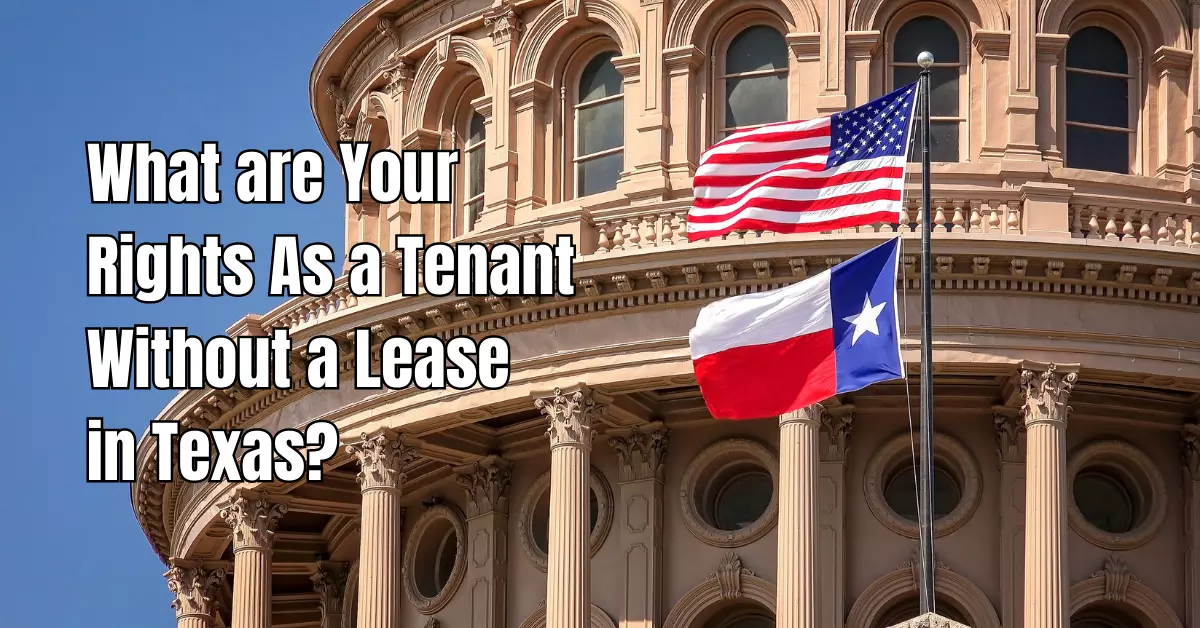What are Your Rights As a Tenant Without a Lease in Texas?
As a tenant in Texas without a lease, you still have legal rights. These include the right to live in a habitable property, a notice before eviction, and protection from landlord retaliation.
what are your rights as a tenant without a lease in texas? Even without a signed lease, the law implies an agreement between the tenant and landlord regarding the terms of the tenancy.
In this article, we will provide a more comprehensive overview of the rights of tenants without a lease in Texas.

Overview Of Tenant Rights In Texas
As a tenant in Texas, it’s important to understand your rights in case you find yourself without a lease.
Knowing what rights you have can help you avoid misunderstandings and legal issues with your landlord. Below are some reasons why understanding tenant rights is important:
- It can help you negotiate better lease terms and conditions.
- You’ll understand what your landlord can or cannot do, such as entering your rental unit without your permission.
- You’ll be aware of your responsibilities as a tenant, such as paying rent and maintaining the rental property’s cleanliness.
- It can help you resolve disputes with your landlord without the need for legal intervention.
Concept Of Tenants Without A Lease
Most tenants in Texas have a written lease, which outlines the terms and conditions of their rental agreement.
However, some tenants may be living in a rental unit without a lease. Here are some things to know about tenants without a lease:
- Tenants without a lease are still entitled to rights and protections under Texas law.
- A tenant without a lease is not considered a squatter or trespasser.
- Without a written lease, the landlord has fewer legal grounds to enforce their expectations of the tenant.
Texas Law On Tenants Without A Lease
Under Texas law, tenants without a lease have certain rights and protections. Here are some key points to keep in mind:
- Tenants without a lease have the right to a habitable and safe dwelling.
- The landlord has the responsibility to keep the rental property in good condition, maintain necessary repairs, and ensure the property complies with local building codes and ordinances.
- The tenant has the right to enjoy the privacy of their rental unit. The landlord cannot enter the rental unit without proper notice, except in case of an emergency.
- If the landlord wants the tenant to vacate the rental unit, they must provide a written notice to the tenant.
- The tenant has the right to a notice before the landlord can legally evict them.
- The tenant without a lease is still responsible for paying rent on time and following other obligations as determined by Texas law.

Rights Of Tenants Without A Lease In Texas
As a tenant without a lease in Texas, it’s important to know your rights. Even without a formal contract, landlords have obligations to ensure a safe and comfortable living environment for their tenants.
Here are some of the key rights you have as a tenant without a lease in Texas:
Right To Habitable Dwelling
- Landlords must provide safe living conditions that meet basic health and safety requirements.
- The premises must have working plumbing, hot water, heating, and electrical systems, among other things.
- Landlords must make necessary repairs within a reasonable timeframe once notified of any issues.
- Tenants can file complaints with the local authorities if their landlord does not meet these standards.
Right To Privacy
- Tenants are entitled to reasonable privacy in their living space.
- Landlords cannot enter a rental unit without written notice, except in cases of an emergency or if the tenant has abandoned the premises.
- Tenants have the right to refuse entry to their landlord if they do not give proper notice or if it is not an emergency situation.
Right To Repairs
- Landlords are responsible for maintaining a tenant’s rental unit.
- Tenants can request repairs in writing and the landlord must respond within a reasonable time frame.
- If the landlord does not make the necessary repairs, tenants may take legal action or withhold rent until the repairs are made.

Right To Withhold Rent
- Tenants have the right to withhold rent if the landlord fails to make necessary repairs that substantially affect the tenant’s health and safety.
- The tenant must give the landlord notice of the issue and a reasonable amount of time to make repairs before taking this action.
- If the landlord still does not make the repairs, the tenant may be able to terminate the lease or defend against eviction.
Right To Eviction Process
- Landlords cannot force tenants out without following the proper legal process.
- The landlord must give written notice of the eviction and provide reasons for the action.
- Tenants have the right to respond to an eviction notice and may have the opportunity to resolve the issue before being forced to leave.
Frequently Asked Questions For What Are Your Rights As A Tenant Without A Lease In Texas?
What Are My Rights As A Tenant Without A Lease In Texas?
As a tenant without a lease in Texas, you have rights such as the right to live in a habitable home, the right to privacy, and the right to a notice before eviction.
Can A Landlord Kick Me Out Without A Lease In Texas?
No, a landlord cannot simply kick you out without notice. They must provide a written notice to vacate before beginning the eviction process.
What If My Landlord Refuses To Make Necessary Repairs?
If your landlord refuses to make necessary repairs, you may be able to file a complaint with the Texas tenant advisor or take legal action through the court system.
How Can I Protect Myself As A Tenant Without A Lease In Texas?
To protect yourself as a tenant without a lease in Texas, make sure to keep a copy of any written agreements and communication with your landlord, document any issues or requests for repairs, and stay informed about your rights as a tenant.
Conclusion
Asserting your rights as a Texas tenant without a lease needn’t feel like a battle. You’re protected by law, entitled to safe housing, and can’t be evicted without due process.
Understand your rights, use them wisely, and your renting journey can be a far less turbulent one.
Reference
https://www.texasattorneygeneral.gov/consumer-protection/home-real-estate-and-travel/renters-rights
Im currently at a property that was sold,I never recived a written notice to vacate from the previous owner who sold and the new property owners are asking for rent and have served us a 30day notice 2days ago can I be evicted befor the 30 day notice.
Hello Jason,
It’s important to note that even without a formal lease, you have rights as a tenant in Texas. When a property is sold, the new owner typically assumes the responsibilities of the previous landlord, including any verbal or informal rental agreements.
As per Texas law, a landlord must provide a written notice to vacate, and this notice typically should give you 30 days to leave the property. If you’ve received this notice only two days ago, you cannot be legally evicted before the 30-day period is up. During this time, it would be wise to either negotiate with the new property owner if you wish to stay or begin looking for a new place to live.
If you feel your rights are being violated or the eviction process is not being properly followed, you may want to contact a local tenant’s rights organization or seek legal advice to explore your options. Keeping records of all communications with both the previous and current landlord can also be helpful in such situations.
Good luck, and I hope this situation is resolved smoothly for you.
My name is Techonia Jones and I live in these apartments called reserve at eagle landing.my address is 1010 Sun prairie Dr. Apt g-401. I payed under the table to get in these apartments. I pay my rent. I don’t have a lease. So I ask them for my lease and they can’t never print me one out. So they are trying to take me to court